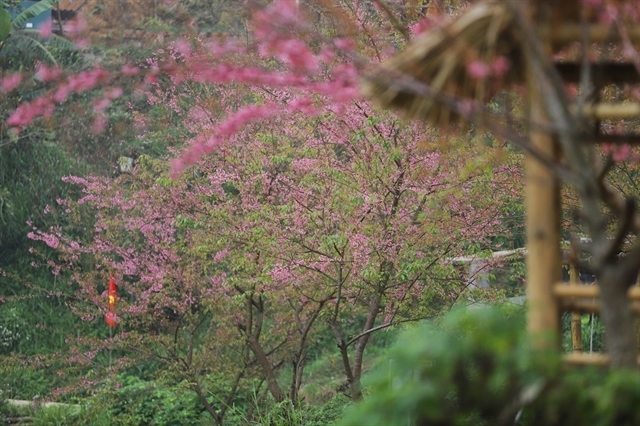 Features
Features

Natural beauty and rich traditional culture are proving advantageous for many localities in the central province of Thừa Thiên-Huế, which are making great strides in their development of community-based tourism.
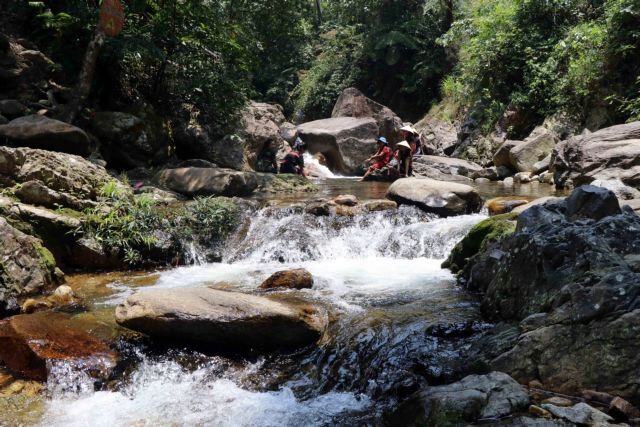
|
| WATER WORLD: The wild beauty of A Nô Waterfall near A Nô community tourism village in A Lưới District. VNA/VNS Photo Đỗ Trưởng |
Natural beauty and rich traditional culture are proving advantageous for many localities in the central province of Thừa Thiên-Huế, which are making great strides in their development of community-based tourism.
The mountain district of A Lưới has preserved the unique cultural identity of ethnic minorities such as the Cơ Tu, Pa Cô and Tà Ôi, and the immense primaeval forests of the majestic Trường Sơn Mountain Range have emerged as an outstanding draw for tourists from near and far.
The creation of tourism villages and cooperatives across the district focusing on presenting the traditional and cultural identities of local ethnic people through high-quality tourism services has increasingly lured visitors to the area, particularly during national holidays and after the pandemic.
Hồ Thị Trâm said her native A Nôr in Hồng Kim Commune became a community-based tourism village about three years ago with the support of a foreign-funded project.
The provincial authorities issued a resolution on supporting community-based tourism through to 2025.
The village is home to the Pa Cô ethnic group, which boasts a rich traditional identity featuring folk singing and the community festivals of A Riêu Piing and A Riêu A Da.
"First, the local households encouraged to attend training courses on the new way of 'doing tourism' were bewildered, but they gradually became more familiar with it," said Trâm.
"They were trained in organising community events, hosting rooms, and communicating with tourists, including foreigners. This has helped them improve their tourism knowledge and preserve their distinct culture."
Due to this, tourism has significantly contributed to improving local people's living standards.
A Nôr Waterfall
Besides the daily customs and folk games that still prevail today, not too far from the village, the A Nôr Waterfall Site provides an idyllic place for swimming and relaxing with its three waterfalls of varying sizes.
Located in Hồng Kim Commune, about 2km from the centre of A Lưới District and 60km from Huế City, the waterfall is becoming a standout community tourism destination in the province.
Along the concrete road leading to the waterfall are several traditional stilt houses hidden under a canopy of beautiful green trees, ready to welcome visitors for an overnight stay.
After being affected by the pandemic for a long time, A Nôr community tourism village is vibrant again. Thousands of tourists have been arriving here to experience the local culture, enjoy the cuisine, and immerse themselves in the cool water at the foot of A Nôr Waterfall while admiring the majestic wild mountain scenery.
The waterfall has two layers, including a serene 2m deep 'swimming pool' that sparkles an emerald green.
With substantial investment in tourism infrastructure and reasonable accommodation prices, of about VNĐ200,000 per person, per night, A Nôr Village provides an environmentally-friendly tourist spot that should not be missed when visiting Thừa Thiên-Huế.
"Most of the village's household representatives were cooperative members and participated in self-management teams to protect the forest. This creates a close connection while sustainably developing tourism," the Director of the Cooperative of A Nôr Community-based and Ecotourism Village, Hoàng Thanh Duy, said.
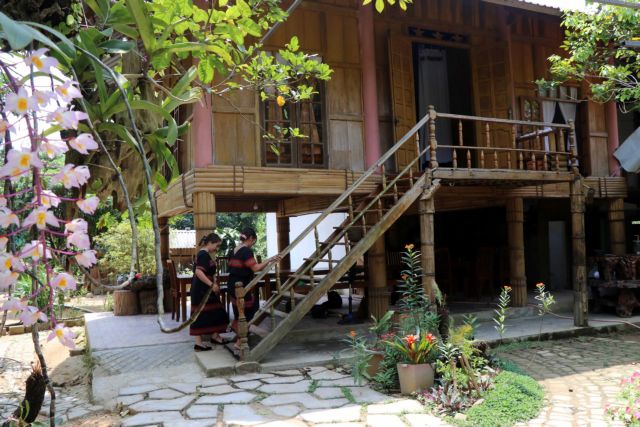
|
| TRADITIONAL LIVING: A stilt house is used as a homestay for tourists in A Nô Village, Hồng Kim Commune. The village has succeeded in community tourism since it was supported by a foreign-funded project. VNA/VNS Photo Đỗ Trưởng |
"Members of the cooperative are trained in tourism skills and creating local tourism products. Coming to the community tourism village, visitors can learn and discover many specialities of the mountain area here, such as A Lưới beef, sticky rice and wild honey.
"They can also buy local handicrafts made of rattan and bamboo, wood carving and woven products."
A Lưới District is developing tourism as an important economic sector, with local traditional cultural conservation combined with environmental protection and safety.
Vice Chairman of A Lưới People's Committee Hồ Văn Ngum said the district had potential for tourism development due to its cool climate, majestic unspoiled landscapes and indigenous communities rich in cultural identity as well as being located on the historical Hồ Chí Minh Trail.
"Besides a community tourism model, the district also aims to enrich and diversify local tourism products, contributing to the attraction of tourists. It has regularly organised cultural and festive activities on traditional food and gong performances," Ngum said.
"The locality has contracted 100 households to protect forests in 39 communities, from which many community-based tourism spots have been formed."
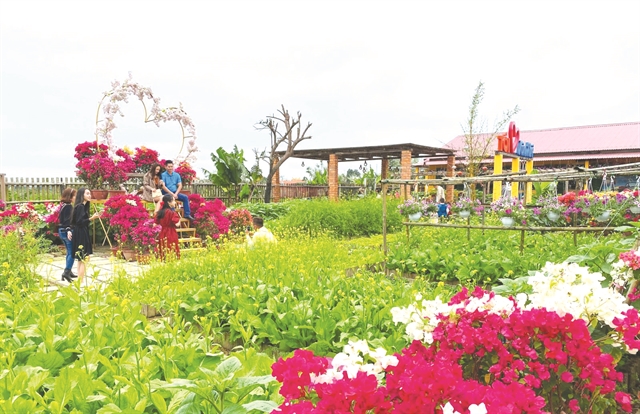
|
| FLOWERING TOURISM: Vân Thê Garden & Homestay is a much-loved community-based tourism experience in Hương Thủy Town. Photo baothuathienhue.vn |
Hương Thủy ambition
In its goals of tourism development by 2025, Hương Thủy Town, a locality with emerging strength in community-based tourism, is targeting to welcome 250,000 visitors, including 30-40 per cent of foreigners, to bring in a revenue of VNĐ400 billion (US$17 million).
The town regards community-based tourism as its main money-spinner, accounting for a high proportion of its economic structure. It has several strong foundations to build upon its goals.
The locality has strengths in ecological diversity, cultural identity and scenic spots. A high density of rivers, waterfalls and rapids has created wonderful natural scenes, such as the waterfalls of Đá Dăm, Chín Chàng and Khe De, as well as the lakes of Tả Trạch, Khe Lời, Bàu Họ, Châu Sơn and Ba Cửa. There is also an abundance of primary forests and prestigious historical and cultural relics.
Several traditional arts and crafts, such as hat-making, incense sticks, blacksmithing and knitting, and various customs and habits of the indigenous people, are maintained through a plethora of festivals.
The town is also located near Phú Bài International Airport, not far from Chân Mây-Lăng Cô economic zone and coastal Đà Nẵng City.
Such factors all create favourable conditions for the locality to expand trade and integration with the whole country and wider Southeast Asia while boosting the provision of community-based eco-tours.
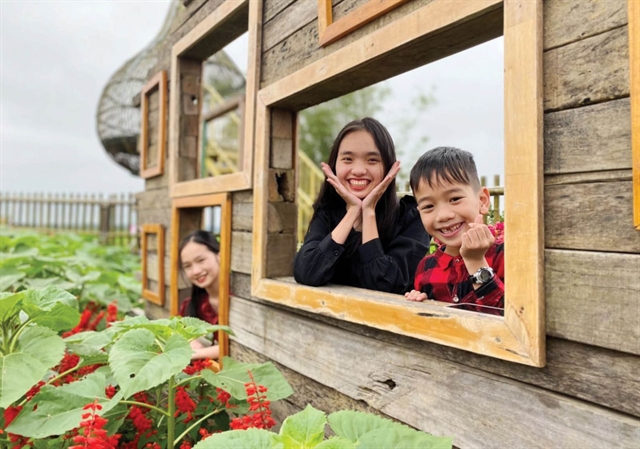
|
| ALL SMILES: Visitors enjoy staying at a community-based tourism homestay in Hương Thủy Town. Photo baothuathienhue.vn |
Ngô Thị Ái Hương, vice chairwoman of the People's Committee of Hương Thủy Town, said community-based tourism created a model in which the residential community both directly provides products and services and is responsible for protecting tourism resources.
"This reciprocity helps tourism develop, creates more jobs, and increases income for local communities," Hương said. "It is only when people really benefit that community-based tourism can develop and succeed."
A series of community initiatives and projects is ensuring that the culturally rich and stunning scenery throughout Thừa Thiên-Huế makes the province a tourist draw in the country's central region. VNS




